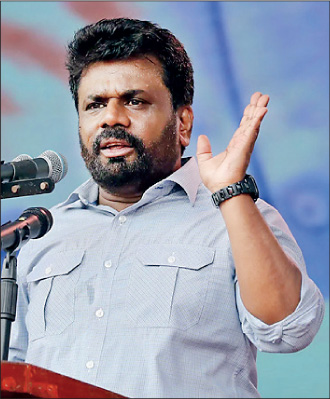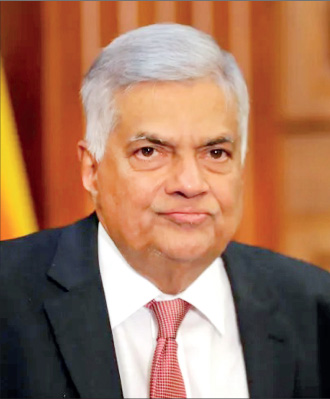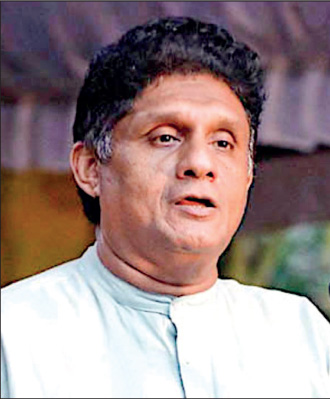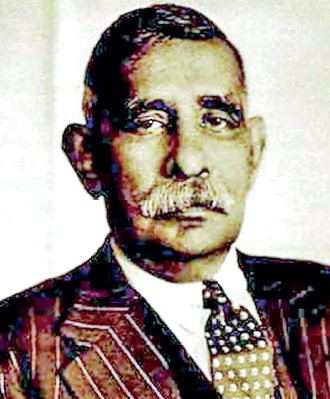Monday Feb 23, 2026
Monday Feb 23, 2026
Monday, 27 January 2025 00:00 - - {{hitsCtrl.values.hits}}

President Anura Kumara Dissanayake

Ranil Wickremesinghe

Sajith Premadasa

D.S. Senanayake
|
 The August 2023 downgrading of the United States (US) long-term credit rating to AA+ from AAA by Fitch Ratings took international analysts by surprise. The basis for the downgrade: “expected fiscal deterioration over the next three years, a high and growing general government debt burden…” but more significantly: “erosion of governance relative to ‘AA’ and ‘AAA’ rated peers over the last two decades…” This was a specific reference to the politicisation of the previously procedural act of increasing the debt ceiling of the United States Government to meet financial obligations.
The August 2023 downgrading of the United States (US) long-term credit rating to AA+ from AAA by Fitch Ratings took international analysts by surprise. The basis for the downgrade: “expected fiscal deterioration over the next three years, a high and growing general government debt burden…” but more significantly: “erosion of governance relative to ‘AA’ and ‘AAA’ rated peers over the last two decades…” This was a specific reference to the politicisation of the previously procedural act of increasing the debt ceiling of the United States Government to meet financial obligations.
Sri Lankans must come to appreciate and acknowledge these dynamics between a dangerous policy consensus, governance deficits, institutional degradation and politicisation of organs of government. Politicisation of institutions leads to a breakdown of norms and a diluting of whatever meritocracy existed therein; abandoning a culture of deliberative decision-making and deference to expertise and intellect.
Consider these dynamics against the context of the potential consolidation of the so-called right wing of Sri Lankan politics, as recently suggested by a senior MP of the Samagi Jana Balawegaya (SJB). None of the more prominent members of the United National Party (UNP) were able to win their seats, indeed many did not even contest under the UNP, Sagala Ratnayake for instance, contested under the Democratic National Front’s ‘Gas Cylinder’. The General Secretary of the Party also failed to win her seat while Vajira Abeywardena’s presence as Chairman of the party personifies the failure of meritocracy within the Party.
This has been the story of the UNP and a definitive resource for this history is the author and public intellectual Prof. Rajiva Wijesinha, whose latest book is aptly titled: “Ranil Wickremesinghe and the Emasculation of the UNP”. Prof. Wijesinha reveals a disturbing pattern of behaviour in the leadership of the Party, especially the interventions and intrigues of Wickremesinghe during his multi-decade political career.
A party divided
It is worth exploring these tendencies of Wickremesinghe in the context of his leadership of the Party; Prof. Wijesinha reveals the internal divisions in the UNP and how the establishment would not tolerate substantive dissent; such as by senior Party members Gamini Jayasuriya and Ranjith Atapattu, who objected to the Indo-Lanka Accord of 1987, especially provisions that merged the North and East. It is partly the story of how internal dissent was quelled by J.R. Jayewardene through the ambitious instrument of Ranil Wickremesinghe and how this led to the promotion of less talented, but more compliant individuals in that party.
Wickremesinghe’s career was defined by what critics like Prof. Wijesinha have suggested was a strategy of appeasement of Prabhakaran and the LTTE. Alongside the security aspect of this dynamic, Wickremesinghe also supported going beyond full implementation of the 13th Amendment, having made references to the explicitly Federal Austrian model of government. Wickremesinghe’s impact on the UNP discourse, particularly on Sri Lanka’s ‘National Question’, is part of the reason for the collapse of the Liberal wing of our politics and the rise of a reactionary form of ultra-nationalism. Prof. Wijesinha notes the “sinister” nature of Wickremesinghe’s “allegiance” to the Tamil National Alliance (TNA) when “it was clear that their approach was dictated by the LTTE”. How did Wickremesinghe’s UNP come to so brazenly alienate large swathes of the country on the central political issue of that period?
How did the party of Senanayake and Premadasa become the party that co-sponsored a resolution at the United Nations Human Rights Council calling for international judges to be part of a justice mechanism in Sri Lanka’s alleged war crimes? Why did Wickremesinghe’s 2015 Yahapalanaya Government offer China a 99-year lease on a strategic asset in India’s traditional sphere of influence? Institutions that are overly dependent on a singular authority and personality often become captive to the rigid dogmas of that individual, at the expense of wider constituencies.
The evolution of the (Centre) Right
Coming back to this potential reunification of Sri Lanka’s ‘Right Wing’, let us first recall that it was Ranil Wickremesinghe that entered the UNP into the International Democracy Union (IDU), the global collective of centre-right political parties. The IDU also includes the UK Conservative Party which presents an interesting parallel; once the UK’s natural party of government, the Conservatives or ‘Tories’ are now possibly third behind Reform UK in many electorates. The drift away from the liberal conservatism of Harold Macmillan or Benjamin Disraeli, towards the more extreme Libertarianism of Thatcher and those that succeeded her, has left the Tory Party in its current state. Indeed, the Number 10 merry-go-round was at its peak when the party’s Libertarian wing had control of Leadership and administration through the short-lived reign of Prime Minister Liz Truss.
Truss and her Chancellor of the Exchequer, Kwasi Kwarteng, presented the now infamous “mini-budget” in September 2022, cutting some GBP 45 billion in taxes, one of the largest unfunded tax cuts in British history. Prime Minister Truss failed to request an independent report from the Office for Budget Responsibility (OBR) that would have analysed the budget’s financial projections and implications for the deficit. This failure to meet operational norms and ignoring of the independent OBR created the sell-off in the Bond Market, costing Truss her Premiership, the shortest in the UK’s history.
A lack of deliberation and an evading of institutional and procedural norms; the Truss administration was incredibly damaging to the credibility of the Conservative Party. The signs, however, had not been promising in the lead up given that David Cameron, Theresa May and Boris Johnson had all failed in their own ways.
There are conflicting narratives about whether it was Thatcher herself that failed to generate a strong succession plan in the Conservative Party. The periods of John Major, William Hague, Ian Duncan Smith et al were full of factionalism and in-fighting. Major was himself a compromise candidate after the vacuum left by Thatcher whose authoritarian tendencies within the party mirrors those of Ranil Wickremesinghe as leader of the UNP.
It was exactly this lack of upward mobility within the UNP as well as failures of the Party while in Government, that prompted the formation of the breakaway SJB under Sajith Premadasa, a moderate liberal with ‘New Deal’ tendencies. With Premadasa out-performing his own party in each of the Presidential elections held in 2019 and 2024, why does the SJB seem so interested in an alliance with a Party that has been so roundly rejected? Indeed, the failures of Yahapalanaya under Wickremesinghe are exemplified by the Central Bank bond scam which is covered in Prof. Wijesinha’s aforementioned book, reminding us of the “unprecedented” intervention and involvement by then Governor of the Central Bank, Arjuna Mahendran, handpicked by Wickremesinghe for the job. Mahendran had “entered the Dealer’s floor twice” that day in 2016 and instructed Dealers to substantially increase the value of bonds to be issued; even encountering dissent from the Dealers; “The officials we questioned were obviously deeply upset” by what had occurred on the floor that day.
‘Kalu Lucky’
There are still prominent Politicians and MPs who claim that there was no bond scam; it is this white-washing of administrations past that leave Liberal formations with little credibility on governance issues. The 2015-19 administration of Wickremesinghe still celebrates consecutive years of primary account surpluses. As it turned out, the surplus was generated with a tax to GDP of only 11% as well as a reduction in social spending; such a surplus is, by definition, driven by austerity, not revenue-based fiscal consolidation, as was suggested by the IMF, all the way back in 2016.
This flows from the rigid dogmatism of Wickremesinghe’s almost Thatcherite economic belief system. It is one thing for a party’s platform to be completely dependent on leadership but if that leadership has no connection to the grassroots, then that party will also generate policy that is out of touch with the people.
Prof. Wijesinha also reminds us of the UNP’s involvement in some of Sri Lankan history’s bleakest moments, which also involved an associate of Wickremesinghe, known as ‘Kalu Lucky’, organising mobs to protest and intimidate Supreme Court judges. Prof. Wijesinha leans on veteran writer Rajan Hoole who noted in a December 2016 article, a ruling by a three-judge bench of the Supreme Court in June 1983, related to the case brought by Senior Members of the LSSP (Lanka Sama Samaja Party) claiming wrongful arrest and degrading treatment by the Police.
“The court conceded wrongful arrest, but held that the degrading treatment alleged, had not been substantiated by the evidence. It was a minimal judgement…” but still led to “a large crowd… with banners” staging “noisy protests outside the residences of the judges. Wijesinha notes that Kalu Lucky was one of Wickremesinghe’s “acolytes, at whose wedding he had signed”; that claims of mob riots and pogroms being “spontaneous” were tenuous and that “even the most diehard supporters of the UNP grant that elements of the party were involved”.
While Wijesinha confirms that “no direct connection” has been alleged between Ranil and the mobs, “… where Ranil came into his own was with an astonishing take on the suffering that had occurred… that the tragedy that had now struck the non-Sinhala trader, due to the machinations of an extreme political party as a result of their factories and business places being burnt down, was nothing compared to the tragedy imposed on the Sinhala entrepreneur by the Bandaranaikes since 1956”. These vignettes of the UNP reflect the decision making and attitudes of its elite, the same types of elites that are still atop the UNP hierarchy. Wickremesinghe’s ordering of a brutal crackdown of the GotaGoGama (GGG) protest site, in the early hours of 22 July 2022, fits in perfectly with Wickremesinghe’s career and involvements during some of the country’s most brutal periods. The SJB has tried had to distance themselves from the UNP’s historic baggage, which once again questions the rationale for this purported broad alliance.
A soft landing
Instead of trying to explain the nuances of the various intended targets of the IMF program, the Opposition must be focused on one simple question: is this current IMF program and accompanying debt restructuring agreement going to deliver ‘real’ debt sustainability and ‘sustainable’ growth; or is this just a soft landing for the next restructuring? What is the rationale of the IMF claim that Sri Lanka’s debt will be sustainable at 70-75% external debt to GDP and over 100% total public debt to GDP? Is Sri Lanka’s economy able to withstand potential externalities to consistently refinance an ever-growing portfolio of International Sovereign Bonds, whose cost (coupon/ interest rate) will increase with each refinancing?
The IMF program does not place direct limits on Sri Lanka’s external debt stock even though it was the external debt stock that ultimately became unsustainable, instead it seems to control external debt only indirectly, through its Gross Financing Needs (GFN) target. The IMF also seems to underestimate revenue requirements, which has also been in favour of the Government but not necessarily in the long term interests of the people of Sri Lanka. The IMF target of 15% tax to GDP is the very minimum a country with Sri Lanka’s structures should seek to achieve if it is serious about development. On a recent television program, a panel of economic experts all stated that Sri Lanka’s revenue project is all but over. In particular Chartered Accountant Sujeewa Mudalige and Economist Dhananath Fernando, seemed to suggest that Sri Lanka is likely to reach the IMF target and that this would be satisfactory.
The Ranil Wickremesinghe Government negotiated this program with an inadequate revenue target because he knew the political costs of raising revenue, especially from the corporate sector. While the largest among these made extraordinary windfall profits due to tax cuts installed by the Gotabaya Rajapaksa, the corporate sector of Sri Lanka only generated 2% tax to GDP in 2024, two years into a revenue-based fiscal consolidation.
Three decades of decline
The tax to GDP target is also a reflection of Ranil Wickremesinghe’s ideological formation, he is explicitly from the neo-liberal centre-right, believing in small government and low taxes. The NPP Government seems set to follow Wickremesinghe’s austerity policy, it has not as yet signalled measures to target the largest corporates and improve Sri Lanka’s overall corporate tax to GDP; there does not seem to be revolution within either the Inland Revenue Department nor the Customs Department, though both performed better than in the past. Can we liberalise trade with a Customs Department that is expected to generate Rs. 2 trillion in annual revenue?
Under its founder D.S. Senanayake, the UNP was envisioned to be a moderate, liberal conservative party that actively sought to nation-build with an ethos of uniting the country and elevating the lives of all people, especially those with the least in our post-colonial communities. The party has never recovered from its transformation in to a neo-liberal, Centre-Right, corporatist, cosmopolitan party under the 30-year leadership of Wickremesinghe.
Under Wickremesinghe, the UNP never developed a discourse that is critical of income and wealth disparity, it has no analysis of poverty and structures that generate such growing inequities. In a country whose poverty rate has doubled in recent years, this version of the Right Wing is about as far from the political zeitgeist as one can possibly be. The SJB, from its explicitly Social Market/Social Democratic platform, is essentially building an alliance with a party devoid of credibility and belonging to a broken wing of politics.
As Prof. Wijesinha’s work shows, a dependency on elites can destroy an institution; in the case of the UNP, its leadership inertia led to much of its talent leaving or being forced out; a failure of meritocracy. When standards begin to slip it can be difficult to arrest such momentum, even over decades, as has been the case for the UNP. Sri Lanka’s Grand Old Party (GOP) has been in decline for 30 years, showing no signs of real reform; thus its motivations for an alliance with the 40-seat SJB are obvious. What is not obvious are the potential benefits for the SJB, in an alliance with a political party that is the very embodiment of institutional failure and governance decay. Unless the UNP is first reformed from within, the disease of elite control will infect the SJB as well.
(The writer has 15 years of experience in the Financial and Corporate sectors after completing a Degree in Accounting and Finance at the University of Kent (UK). He also holds a Masters in International Relations from the University of Colombo. He is a media presenter, political commentator and Foreign Affairs analyst, invited regularly on television broadcasts as a resource-person. He is also a member of the Working Committee of the Samagi Jana Balawegaya (SJB).)